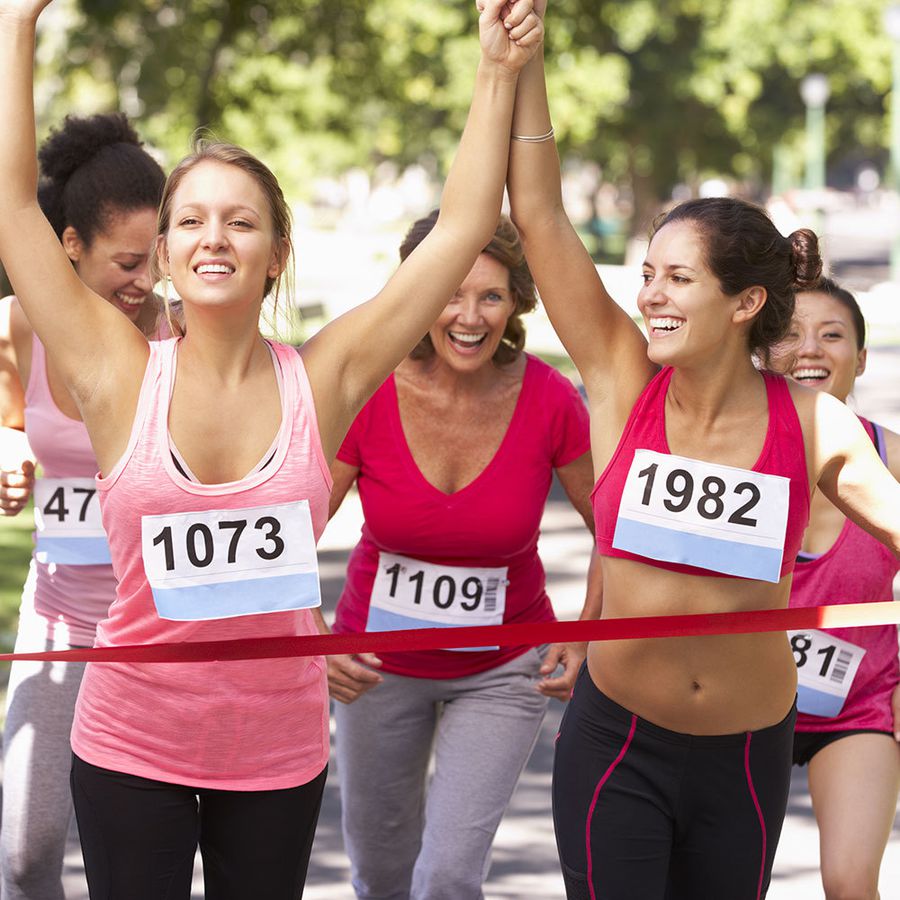
A few Sundays ago, I ran the More/Shape Women’s Half-Marathon-and I had so much fun! The weather was gorgeous, with cool-ish temps, no humidity, and endless sun. My training had been solid, and I’d slept well the night before. The race followed my usual running route, so I knew the course well.
But what ended up being the absolute highlight of the race for me took me by surprise. It wasn’t the pretty views of the park, or even the fact that I beat my goal time by nearly two full minutes (hey, humblebragging is good for you!). What I loved most about the race was that it was a women’s only event. (Run Into Shape with Our 30-Day Running Challenge!)
I'd barely even thought about it before arriving to the park that Sunday morning. Then as I stood in the line for the Port-A-Potties, someone made a "figures the lines are so long, it's a women's race!" joke. I looked around and-oh, that's right-all ladies, with a few male spectators sprinkled in, holding the babies and extra sweatshirts and cameras.
Then later, somewhere between miles 1 and 2, the course curved and I had a clear view of the mass of racers ahead of me. That's when I saw it-hundreds of sun-lit ponytails, bouncing up and down in time with their owners' feet. Honestly, I got a little emotional. Then I was like, What was that about?
The whole race was like that. I wasn’t listening to music (because I do that sometimes), so all I heard was the race volunteers and spectators cheering us on (“Come on, ladies, you’re almost at the top!”), the soft tapping of sneakers on the paved course, and women’s voices and breathing around me. I felt comfortable in a way that took me off guard-I guess because I don’t register feeling particularly uncomfortable around men during races. But the ladies-only crowd felt uniquely inclusive and encouraging.
I felt proud too. Nowadays, female runners are commonplace. In fact, women race way more often than men. But just 50 years ago, running was considered a man’s sport-so much so, that when Roberta “Bobbi” Gibb tried to enter the Boston Marathon in 1966, she was told that “women are physiological incapable of running 26.2 miles.” The longest race non-professionals were allowed to run was 1.5 miles!
And yet here I was, surrounded by women running. It was weirdly empowering. Add in the go-girl support and camaraderie that was palpable on the course, and I couldn't quit smiling as I padded along toward the finish line. Once I crossed it, I lingered for a while, watching woman after woman take their final steps-many of them did so while hand-in-hand with the runner next to them, which only added to the warm fuzzies I felt.
More than anything, I had an overwhelming sense of being at home. Let’s face it, there are some things about running than only other runners can understand-and the same holds true for being a woman. So being among runners who were also women felt like finding my people. Everyone understood the struggle of finding a decent sports bra. At least one person nearby had an emergency tampon on them. Spare hair ties abounded. And we were all doing something totally kickass before noon on a Sunday. If I had been listening to music, you know what I would have had on repeat.






































